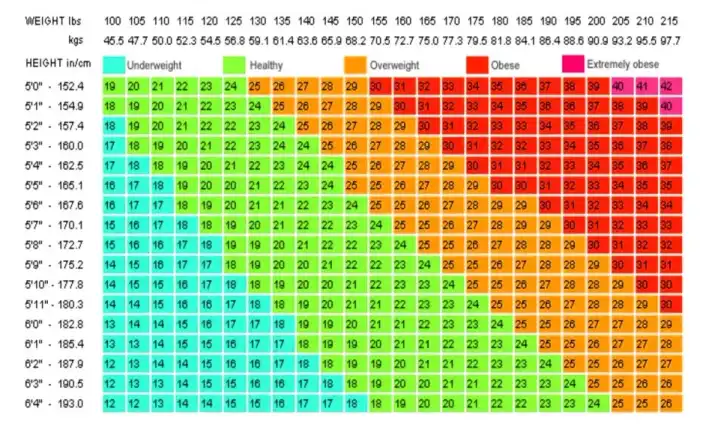Body Mass Index for women
Body Mass Index (BMI) is a measure of body fat based on your height and weight. You can either consult the BMI chart for women or use the BMI calculator provided below to determine your body mass index.
Body Mass Index calculator
Enter your weight, height, age, and gender using standard or metric units in the BMI calculator below:
What is a good BMI for women?
The guideline is between 18.5 and 22.9 for a healthy BMI for women. The World Health Organization (WHO) and the Centers for Disease Control and Prevention (CDC) have established the following categories for adults based on their Body Mass Index (BMI):
| BMI | Weight Status |
|---|---|
| Less than 16 | Severely underweight |
| 16 to 17 | Moderately underweight |
| 17 to 18.5 | Mildly underweight |
| 18.5 to 22.9 | Healthy weight |
| 23 to 25 | Mildly overweight |
| 25 to 30 | Overweight |
| 30 to 35 | Obese class I |
| 35 to 40 | Obese class II |
| Greater than 40 | Obese class III |
BMI chart women
Find below a general adult BMI chart female.

Difference in BMI for women and men.
Body mass index is a measure based on height and weight (see calculation). It’s the same measure for males and females. However, women typically have different body compositions, with men tending to have more muscle mass and women tending to have more body fat. Because of these differences, a healthy BMI range for men and women may be slightly different.
A BMI of 18.5-24.9 is considered a healthy weight range for both men and women. However, some studies suggest that women may have a lower healthy BMI range, with a BMI of 18.5-22.9 being more appropriate according to the World Health Organization.
The potential negative health effects of having a high BMI
According to the Centers for Disease Control and Prevention (CDC), high BMI in women can result in a range of adverse health consequences, such as an elevated risk of developing type 2 diabetes, high blood pressure, heart disease, stroke, and specific cancers such as breast, ovarian, and uterine cancer.
Moreover, excessive weight may increase joint strain, leading to joint pain and osteoarthritis.
Women with high BMI may also encounter pregnancy complications such as gestational diabetes, high blood pressure, and pre-eclampsia, and fertility issues.
Maintaining a healthy weight is crucial for overall well-being and can minimize the risk of developing these and other health concerns. Making healthy lifestyle choices, such as consuming a balanced diet, engaging in regular exercise, and obtaining adequate sleep, is critical for weight management and overall health.
The potential negative health effects of having a low BMI
Women who have a low body mass index (BMI) are at risk of negative health effects. A low BMI can result in a weakened immune system, malnutrition, and nutrient deficiencies that may lead to anemia and weakened bones.
A low BMI may also cause an irregular menstrual cycle in women, which can affect fertility and lead to complications during pregnancy. Furthermore, a low BMI can result in a loss of muscle mass, which may decrease strength and increase the risk of falls and fractures.
In addition, women with a low BMI may have a weakened immune system and be more susceptible to infections and illnesses.
How to calculate BMI for women?
BMI is determined by using the formula: BMI = 703 x weight (in pounds) / height (in inches)^2. Individuals with a weight less than 50 pounds or greater than or equal to 650 pounds, a height less than 3 feet or greater than or equal to 8 feet, a BMI less than 12 or greater than or equal to 100. Pregnant individuals were excluded from the study. Our BMI calculator uses this formula.
BMI formula: 703 x weight [lbs]⁄height [in]2
Women and men have different body compositions; typically, men have a greater proportion of muscle mass, while women tend to have more body fat. As a result of these disparities, the range of BMI considered healthy for men and women may differ slightly.
Problems of the Body Mass Index (BMI) calculation.
The Body Mass Index (BMI) calculation has several limitations, such as:
- The body mass index (BMI) does not factor in individual differences in muscle mass, bone density, and fat distribution, leading to potential inaccuracies in assessing overall health. For instance, athletes and bodybuilders may have a high BMI due to their muscle mass, despite not being overweight or unhealthy.
- It does not distinguish between fat mass and lean mass, which can result in misclassifying individuals as overweight or obese when they may not be. It also fails to consider the location of body fat, as having a significant amount of abdominal fat poses a greater health risk than fat stored elsewhere.
- The BMI does not account for health risks specific to certain groups, such as older adults or certain ethnicities. It also does not factor in an individual's medical history or overall health status.
- The BMI may not be a reliable indicator of health for older adults, as muscle mass decreases with age, potentially leading to a higher BMI but less muscle mass. Finally, the BMI is not suitable for pregnant or lactating women, athletes, or individuals with significant muscle mass.
Therefore, it's important to consider other factors such as body composition, waist circumference, and overall health status before making conclusions about health risks based on BMI. It's important to consult with a healthcare professional for a more accurate assessment of your health status.